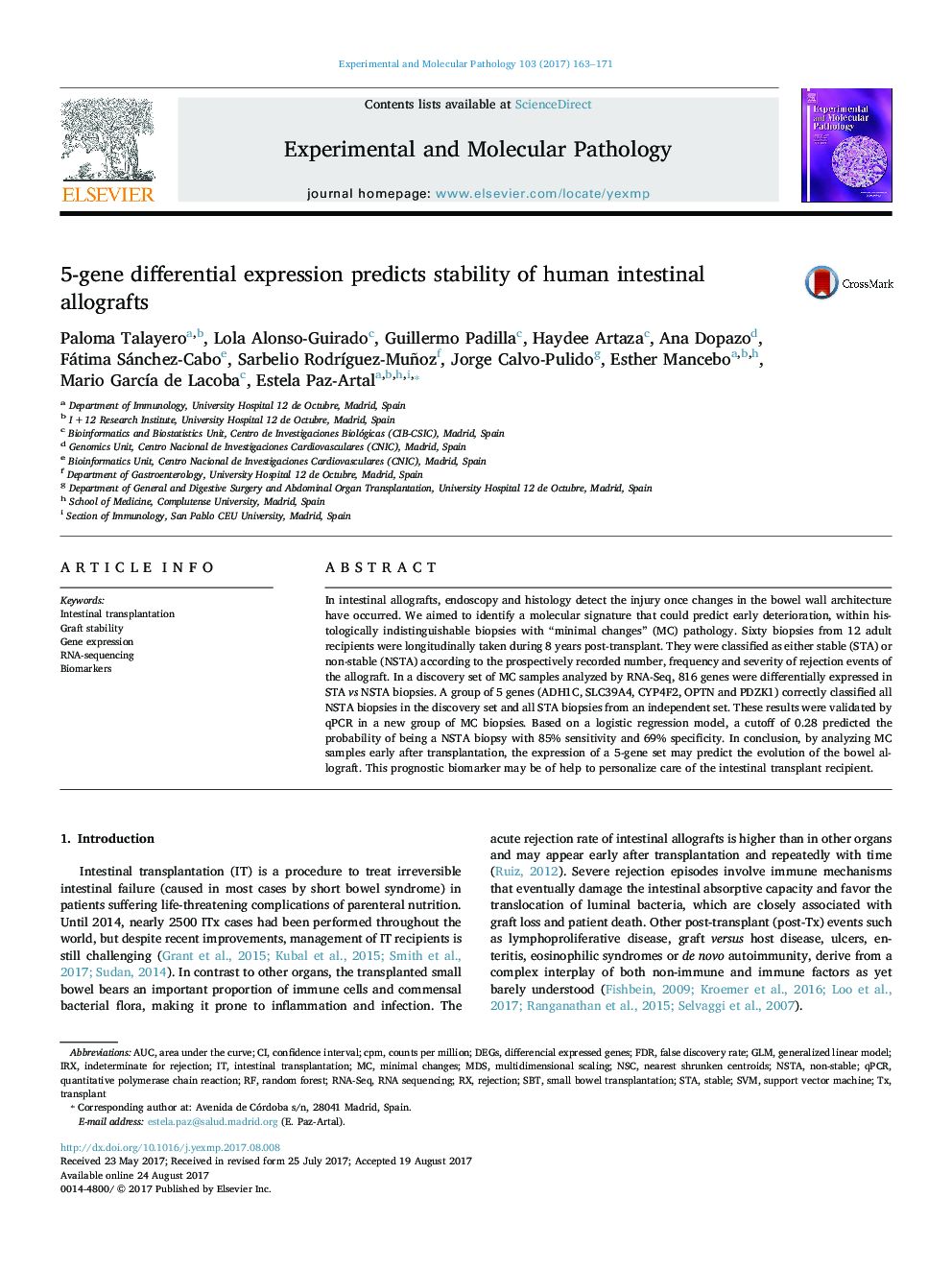| کد مقاله | کد نشریه | سال انتشار | مقاله انگلیسی | نسخه تمام متن |
|---|---|---|---|---|
| 5584373 | 1567915 | 2017 | 9 صفحه PDF | دانلود رایگان |
عنوان انگلیسی مقاله ISI
5-gene differential expression predicts stability of human intestinal allografts
ترجمه فارسی عنوان
افتراق دیفرانسیل ژن پیش بینی کننده پایداری الگوریتم روده انسان است
دانلود مقاله + سفارش ترجمه
دانلود مقاله ISI انگلیسی
رایگان برای ایرانیان
کلمات کلیدی
Irxcounts per millionSBTqPCRDEGsSTAMDSNSCRNA-seqFDRCPMGLMAUC - AUCGene expression - بیان ژنRNA sequencing - ترتیب RNARNA-sequencing - توالی RNARandom forest - جنگلهای تصادفی یا جنگلهای تصمیم تصادفیRejection - طرد شدنconfidence interval - فاصله اطمینانSVM - ماشین بردار پشتیبانیSupport vector machine - ماشین بردار پشتیبانیGeneralized linear model - مدل خطی تعمیمیافتهMultidimensional scaling - مقیاس چند بعدیarea under the curve - منطقه تحت منحنیfalse discovery rate - میزان کشف کاذبBiomarkers - نشانگر زیستی یا بیومارکرquantitative polymerase chain reaction - واکنش زنجیره ای پلیمراز کمیStable - پایدارTransplant - پیوندIntestinal transplantation - پیوند رودهSmall bowel transplantation - پیوند کوچک روده
موضوعات مرتبط
علوم زیستی و بیوفناوری
بیوشیمی، ژنتیک و زیست شناسی مولکولی
بیوشیمی بالینی
چکیده انگلیسی
In intestinal allografts, endoscopy and histology detect the injury once changes in the bowel wall architecture have occurred. We aimed to identify a molecular signature that could predict early deterioration, within histologically indistinguishable biopsies with “minimal changes” (MC) pathology. Sixty biopsies from 12 adult recipients were longitudinally taken during 8Â years post-transplant. They were classified as either stable (STA) or non-stable (NSTA) according to the prospectively recorded number, frequency and severity of rejection events of the allograft. In a discovery set of MC samples analyzed by RNA-Seq, 816 genes were differentially expressed in STA vs NSTA biopsies. A group of 5 genes (ADH1C, SLC39A4, CYP4F2, OPTN and PDZK1) correctly classified all NSTA biopsies in the discovery set and all STA biopsies from an independent set. These results were validated by qPCR in a new group of MC biopsies. Based on a logistic regression model, a cutoff of 0.28 predicted the probability of being a NSTA biopsy with 85% sensitivity and 69% specificity. In conclusion, by analyzing MC samples early after transplantation, the expression of a 5-gene set may predict the evolution of the bowel allograft. This prognostic biomarker may be of help to personalize care of the intestinal transplant recipient.
ناشر
Database: Elsevier - ScienceDirect (ساینس دایرکت)
Journal: Experimental and Molecular Pathology - Volume 103, Issue 2, October 2017, Pages 163-171
Journal: Experimental and Molecular Pathology - Volume 103, Issue 2, October 2017, Pages 163-171
نویسندگان
Paloma Talayero, Lola Alonso-Guirado, Guillermo Padilla, Haydee Artaza, Ana Dopazo, Fátima Sánchez-Cabo, Sarbelio RodrÃguez-Muñoz, Jorge Calvo-Pulido, Esther Mancebo, Mario GarcÃa de Lacoba, Estela Paz-Artal,
